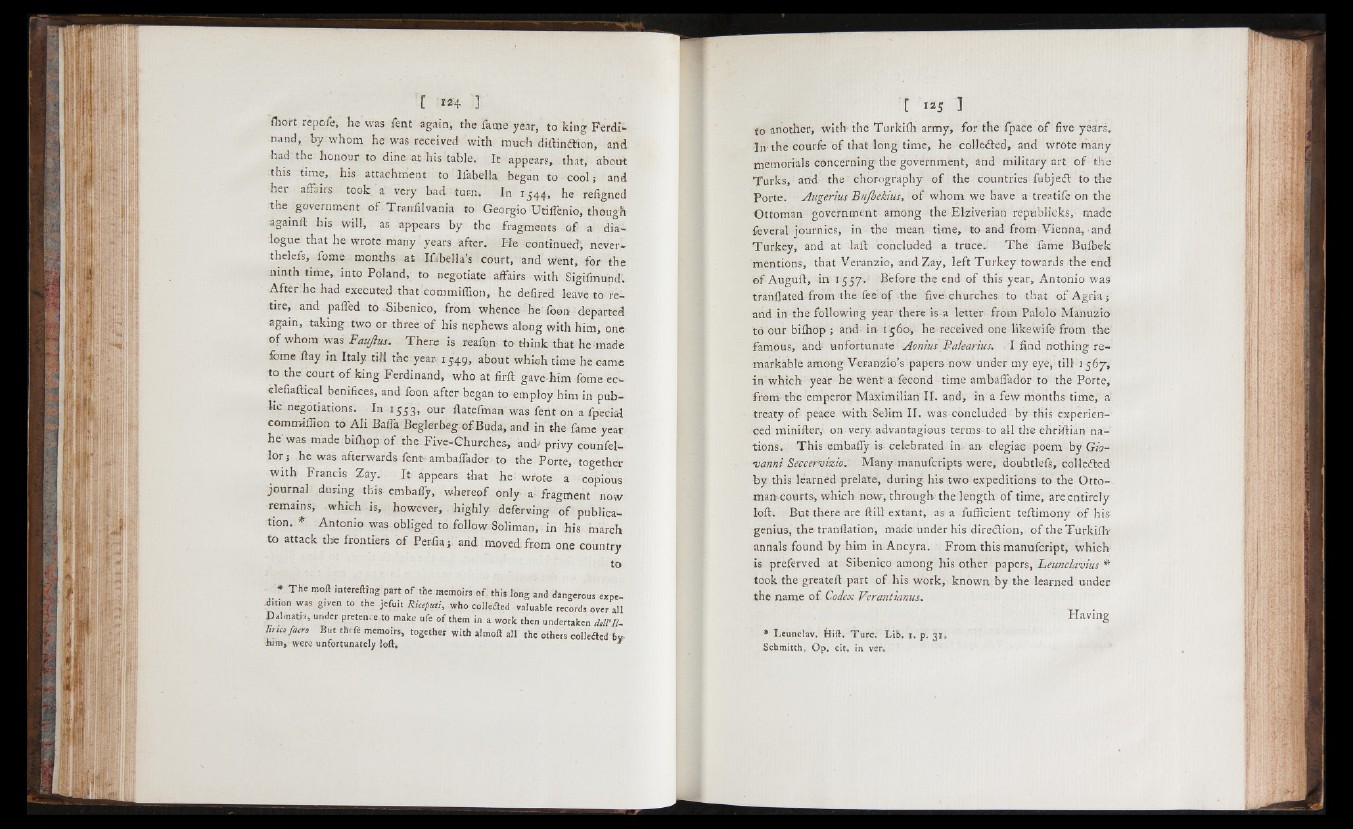
ihort repofe, he was fent again, the fame year, to king Ferdinand,
by whom he was received with much diRindtion, and
had the honour to dine at his table. It appears, that, about
this time, his attachment to liabella began to cool; and
her affairs took, a very bad turn* In 1344, he refigned
the government o f Tranfilvania to Georgio Utiffenio, though
againR his will, as appears by the fragments o f a dialogue
that he wrote many years after. He continued, never—
thelefs, fome months at Iffbella's court, and went, for the
ninth time, into Poland, to negotiate affairs with Sigifmund.
After he had executed that com million, he defired leave to retire,
and paffed to-Sibenico, from whence he foon departed
again, taking two or three o f his nephews along with him, one
o f whom was Faujlus. There is reafon to think that he made
feme Ray in Italy till the year. 1549, about which time he came
to the court o f king Ferdinand, who at firR gave him fome ec-
elefiaflical benifices, and foon after began to employ him in public
negotiations. In 1553, our flatefman was fent on a fpecial
comma flion to Ali Baffa Beglerbeg of Bud a, and in t-he fame year
he was made bifliop o f the Five-Churches, and' privy counfel-
lor; he was afterwards fent ambaffador to the Porte, together
with Francis Zay. It appears that he- wrote a copious
journal during this embaffy, whereof only- a-fragment now
remains, which is, however, highly deferv-ing o f publication.
* Antonio was obliged to follow Soliman, in his march
to attack the frontiers o f Per-fia; and moved from one country
to
* T h e molt intereftfng part o f the memoirs of this long and dangerous expe-
-dition was given to the jefuit Rkeputi, who colleaed valuable records over all
Dalmatia, under pretenc e to make ufe of them in a work then undertaken dill’Il-
Itrtcofdcro But theft memoirs, together with almolt all the others coJlefled 6w
him, were unfortunately loft.
to another, with the Turkilh army, for the fpace o f five years.
I n the eourfe o f that long time, he colledted, and wrote many
memorials concerning the government, and military art o f the
Turks, and the chorography o f the countries fubjedl to the
Porte. Augerius Bujbekius, of whom we have a treatifc on the
Ottoman government among the Elziverian republicks, made
feveral journies, in the mean time, to and from Vienna, - and
Turkey, and at laR concluded a truce. The fame Bufliek
mentions, that Veranzio, and Zay, left Turkey towards the end
of AuguR, in 1557. Before the end o f this year, Antonio was
tranilated from the fee of-the five churches to that o fA g r ia ;
and in the following year there is a letter from Palolo Manuzio
to our bifliop ; and in 1360; he received one likewife from the
famous, and- unfortunate Aomus Balearius. I find nothing remarkable
among Veranzio’s papers now under my eye, till 1367,
in which year he went a feeond time ambaffador to the Porte,
from- the emperor Maximilian II. and, in a few months time, a
treaty of peace with Selim II. was concluded by this experienced
minifier, on very, advantagious terms to all the chrifiian nations.
This embaffy is celebrated in- an elegiae poem by Giovanni
Seccervizio. Many manufcripts were, doubtlefs, colleiled
by this learned prelate, during his two expeditions to the Ottoman
courts, which now, through the length o f time, are entirely
loR. But there are Rill extant, as a fufficient teRimony o f his
genius, the tranflation, made under his diredlion, o f the Turkiih-
annals found by him in Ancyra. From this manufcript, which
is preferved at Sibenico among his other papers, Leunclavius *
took the greateR part o f his work, known by the learned under
the name o f Codex Verantianus.
Having
* Leunclav. ftift. Tu rc . Lib. 1. p. 31.
Schmitth, Op. cit. in ver.